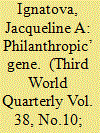| Srl | Item |
| 1 |
ID:
158592


|
|
|
| 2 |
ID:
128465


|
|
|
|
|
| Publication |
2014.
|
| Summary/Abstract |
Over the past decade a new form of philanthropy has emerged, termed 'philanthrocapitalism'. Champions of philanthrocapitalism suggest that private giving can fill the void left by diminished government spending on social and development programmes. Critics suggest that philanthropy is no substitute for strong governmental support for social welfare. Both arguments perpetuate a dichotomy between the public and the private, implying that philanthrocapitalism operates in a vacuum largely divorced from governmental interventions. In this article I challenge that assumption, exploring how new philanthropic initiatives have compelled increased financial support from governments toward the private sector. Drawing on three cases - advanced market commitments (amcs) in drug development; impact investing; and direct philanthropic and governmental grants to corporate entities - I illustrate the ways that governments remain one of the most powerful - if not the most powerful - philanthropic actors in the philanthrocapitalist turn.
|
|
|
|
|
|
|
|
|
|
|
|
|
|
|
|
| 3 |
ID:
154790


|
|
|
|
|
| Summary/Abstract |
Climate change and population growth have prompted calls for African countries to embrace a ‘new Green Revolution’ in order to promote food security. What is ‘new’ about this new Green Revolution? What configurations of capital, the state, agribusiness, and the law define this period of agricultural transition? In this new Green Revolution, I argue, there is a proliferation of new forms of capital – biocapital and philanthrocapital – that integrate biotechnology with philanthropy to create market value. These shifts are engendered by philanthropic giving, in the form of donated genetic material for the development of ‘pro-poor’ biotechnology which normalises seed as commodity, and legislative reform that renders seed patentable material.
|
|
|
|
|
|
|
|
|
|
|
|
|
|
|
|